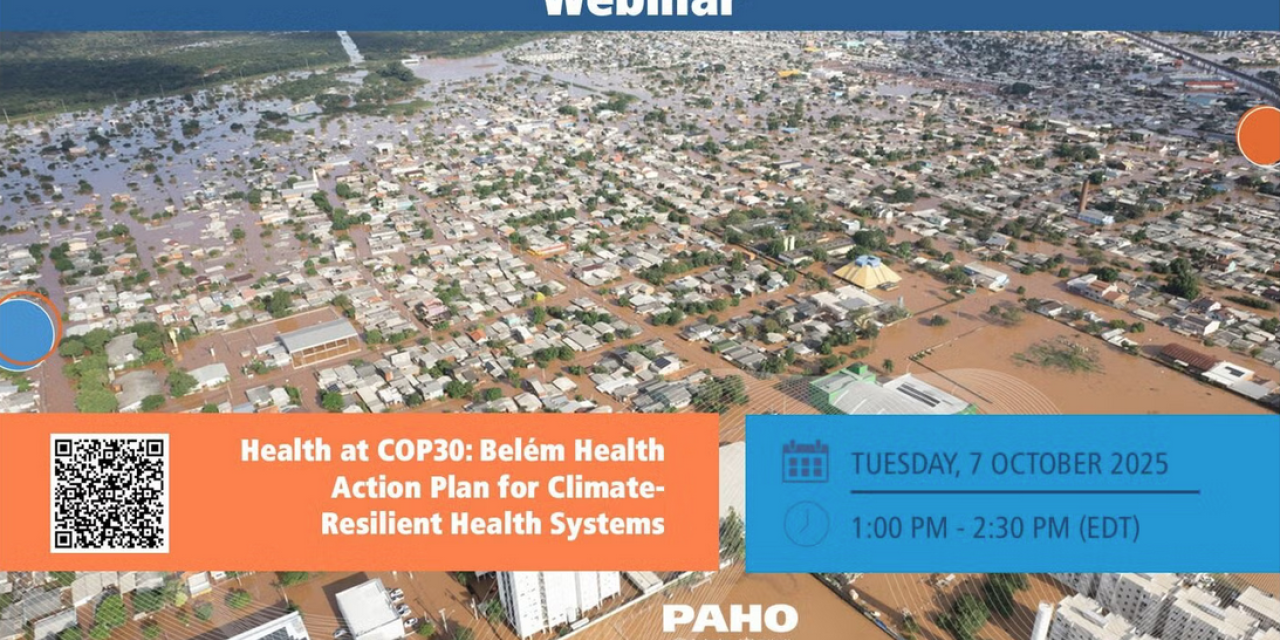Organizations
This webinar is organized by the Pan American Health Organization (PAHO) and the Issued-based Coalition for Latin American and the Caribbean. With COP30 approaching (Belem, Brazil, Nov. 10-21), this joint webinar brings together Member States, Ministries of Health, UN entities, and partners to consolidate a shared vision, ensure alignment across actors, and identify immediate actions that can be advanced in the Americas with global relevance.
Context and themes
This webinar will present and disseminate the Belém Health Action Plan. PAHO will coordinate the discussions with United Nations entities and partners and facilitate a focused exchange with Member States to align inputs for consideration.
The Belém Health Action Plan will provide a roadmap to strengthen health systems for climate resilience, grounded in health equity, climate justice, and participatory governance. It structures action under three complementary lines:
-
Surveillance & Monitoring – climate-informed early warning systems and integrated data platforms.
-
Evidence-based Policy & Capacity Building – workforce upskilling, gender-responsive and equity-driven health policies, integration of mental health and psychosocial support, and promotion of health co-benefits.
-
Innovation & Production – resilient infrastructure, just transitions, sustainable supply chains, and return-on-investment frameworks.
Belem Action Plan
The Belém Health Action Plan (BHAP) represents a landmark opportunity for the Americas to lead on climate and health as the world prepares for COP30. The region faces increasing climate-related health threats—extreme heat, hurricanes, wildfires, floods, air pollution, droughts—that exacerbate inequities and strain already fragile health systems. At the same time, the Americas are home to innovative practices, strong intergovernmental collaboration, and an active UN interagency platform through the Issue-Based Coalition on Climate Change and Resilience (IBC-CCR).
This webinar will provide a critical platform for Member States, Ministries of Health, and UN agencies to come together and build a shared vision for BHAP implementation. By fostering alignment across national priorities and UN system support, the session will help ensure that the Plan translates into concrete, coordinated actions with measurable health and equity outcomes.
Bringing these diverse actors together at this moment—just ahead of COP30—will create momentum, clarify roles and contributions, and provide an early opportunity to agree on “no-regrets” actions that can be scaled across the region. The session is therefore not only a step toward implementation of BHAP, but also a signal of political commitment and solidarity to address the health dimensions of climate change through equity, justice, and resilience.
Objectives
The webinar has these objectives:
-
Present and disseminate the BHAP, including cross-cutting priorities and the three action lines.
-
Share immediate and near-term implementation steps and milestones toward COP30.
-
Gather targeted inputs from Member States, UN entities, and partners to inform a consolidated first-year action package.
-
Map roles and opportunities for interagency collaboration under the IBC-CCR umbrella ahead of COP30, coordinated by PAHO.
-
Confirm responsibilities, next steps, and a near-term timeline with the Presidency of Brazil for COP30, MoH Brazil, and PAHO.
Participation
-
DATE: October 7, 2025, Tuesday
-
LANGUAGES: English, Spanish, Portuguese
-
TIME: 1:00pm - 2:30pm (ET, Washington)
-
PLATFORM: ZOOM (with registration)

Agenda
Opening and framing. Why the Belem Action Plan matters, road to COP30, objectives of the session
Presidency of Brazil COP30, Ministry of Health of Brazil, PAHO
Belem Action Plan: structure, cross-cutting priorities, action lines, initial steps, timeline
PAHO, Ministry of Health of Brazil, COP30 Presidency
Member States: national perspectives, priorities, and first-year opportunities
Selected Ministry of Health representatives from the Region
UN approach: contributions under IBC-CCR, alignment with existing mandates and platforms
UNEP, UNDP, WMO, among others.
Open Discussion and partner inputs: comments from civil society, academia, philanthropic partners
Moderation: PAHO
Closing and next steps
PAHO, COP30 Presidency, Ministry of Health of Brazil
